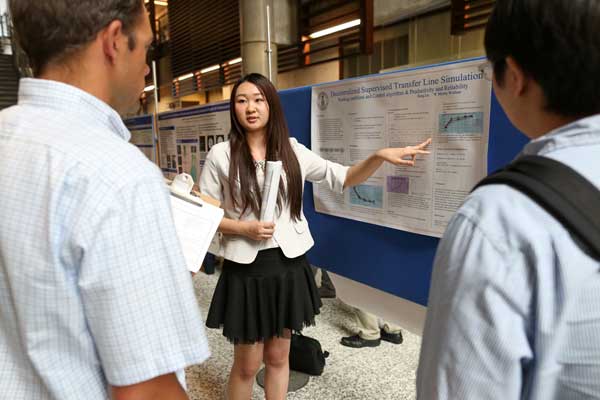Crowded around glossy posters, inquiring about dental resins and porous structural materials, U of T Engineering’s undergraduate students buzzed with excitement as they shared their summer research projects.
The event, known as UnERD (Undergraduate Engineering Research Day), was a one-day research symposium that gave students an opportunity to gain additional feedback and recognition for their hard work over the summer months. Presentations include posters and podiums from over 100 students covering topics from biomedical engineering and energy, to materials science and computer modelling.
After two keynote talks from Professor Paul Santerre (IBBME) and Professor Craig Simmons (MIE), a panel of judges also selected three grand prize winners who have the opportunity to publish their research in the Canadian Young Scientist Journal.
“Research is such an important component engineering, I wanted to be part of an event that celebrates that,” said engineering undergraduate Amy Zhao (MSE 1T6), who organized the event with fellow co-chair Marshell Ma (MIE 1T5).
Learn more about this year’s grand prize winners:
Ahmed Anwer (MechE 1T6): Functionally Graded Polymeric Structures and Their Superior Impact Properties
Closed-cell metallic foams – high-impact resistant structures that are lightweight because of tiny gas-filled pockets – are currently a widely-used material for most impact applications. However, these materials are expensive to manufacture. Anwer and the Smart and Adaptive Polymers Laboratory (SAPL) tested five different porous materials for their impact strength-to-weight ratio, and found that functionally graded porous structures – a certain method for manufacturing porous structures – are optimal.
Mitchell Nascimento (IBBME): Synthesis of Antimicrobial Monomers Using the Antibiotics Ciprofloxacin and Metronidazole
Dental resin composites are a promising material in dental restoration, but are subject to significant breakdown in the mouth. Nascimento, who studies fulltime at the University of Windsor and worked as a research assistant at U of T for the summer, developed an antimicrobial composite by coupling pharmaceutical drugs with dental resin which inhibits breakdown and can reduce the necessity of dental restoration implants.
Matthew Langley (EngSci 1T5): Modeling and characterization of donor cell memory in T cell progenitor-derived induced pluripotent stem cells
Adult cells can be programmed to become induced pluripotent stem cells (iPSCs) – stem cells that can be applied to any tissue in the body. However, these cells exhibit “donor cell memory,” meaning they display different gene expressions dependent on their cell type, which limits their use.
Langley has developed a novel method for characterizing donor cell memory such that it can be utilized to stabilize the cell. This serves to further enhance the utility of stem cells.
UnERD happens every summer at U of T Engineering, and is open to any undergraduate university student conducting research in the Faculty over summer. The initiative is supported in part through the Institute for Leadership Education in Engineering.




